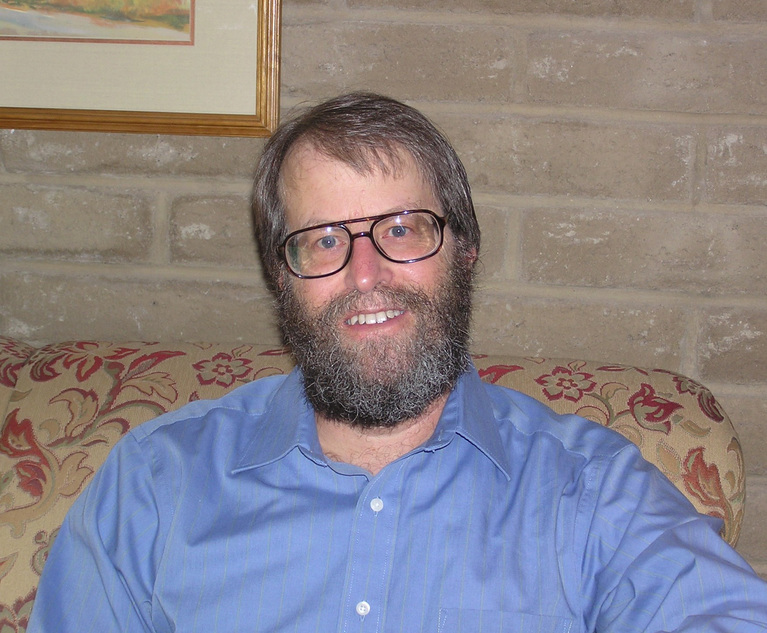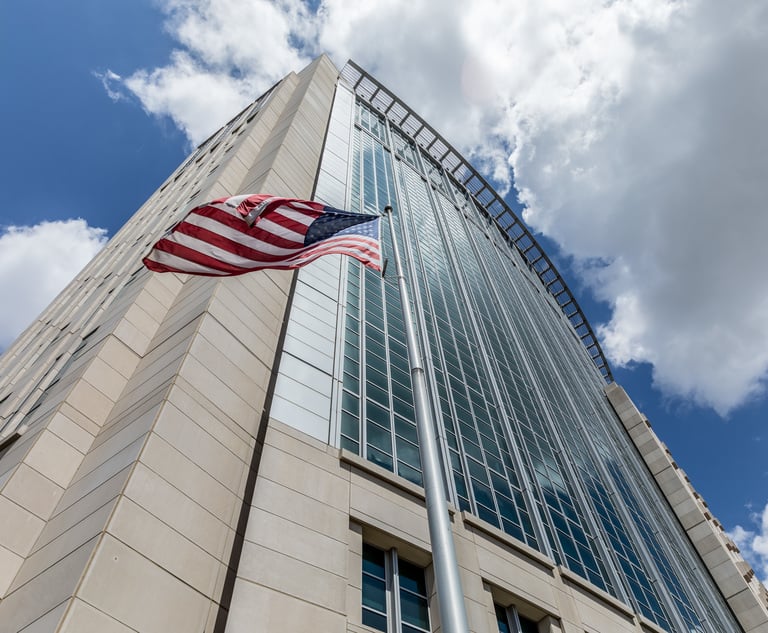 Attorney Sebastian Graber. Courtesy photo
Attorney Sebastian Graber. Courtesy photo The Marble Palace Blog: A Lawyer Who Won a 1983 SCOTUS Free Speech Case on Behalf of His Wife Has Died at Age 70
Sebastian Graber, a lawyer who represented activists, was best known for a case about the right to demonstrate on Supreme Court grounds.
August 10, 2022 at 03:37 PM
4 minute read
Thank you for reading The Marble Palace Blog, which I hope will inform and surprise you about the Supreme Court of the United States. My name is Tony Mauro. I've covered the Supreme Court since 1979 and for ALM since 2000. I semiretired in 2019, but I am still fascinated by the high court. I'll welcome any tips or suggestions for topics to write about. You can reach me at [email protected].
Sebastian Graber argued only one U.S. Supreme Court case in his career. But it was an important case, and an unusual one. He argued on behalf of his wife, Mary Grace, who was an appellee in the First Amendment case before the court. And they won.
The 1983 decision was United States v. Grace, and it was close to home—literally. At issue was a federal law barring banners, flags and the like in the Supreme Court building and on its grounds, including its surrounding sidewalks. Unanimously, the court ruled that expressive conduct is allowed on public sidewalks around the court, deemed to be protected by the First Amendment as a public forum. Justice Thurgood Marshall would have gone further, allowing expressive conduct on the court premises, not just the sidewalks.
Graber died Aug. 4 at age 70 after a long illness, according to his wife Grace. "I am profoundly grateful for my life with this interesting, devoted, clever and gentle man," she said in an interview.
Before and after the Supreme Court case, Graber often had a solo practice in Virginia, representing a range of activists including the Berrigan brothers, Elizabeth McAlister and Daniel Ellsberg, Grace said. She was an activist too, and she met Graber when he defended her for free when she was arrested at a Pentagon protest in 1978. "It was kind of romantic," she said. For years, Grace has been a "legal observer," helping during demonstrations to interact with police and protesters so as to "try to keep them a little calmer," she said.
The Supreme Court case developed when a friend named Thaddeus Zywicki went to Graber complaining that a Supreme Court police officer threatened to arrest him on the sidewalk before the high court for distributing leaflets about judges unfit for the bench. Zywicki left before being arrested, but returned.
Grace decided to get involved by displaying the words of the First Amendment on a sign that she would take to the court. She expected to be arrested. But Graber urged her to stay on the public sidewalk with the sign, figuring that her chances of being arrested were smaller than if she went up the marble plaza.
Graber was right. During the oral argument in 1983, he went up against the formidable then-Solicitor General Rex Lee, who was wearing his morning coat, while the bearded Graber wore his "old scruffy ponytail," Grace recalled. Graber fielded tough questions, but in the end persuaded the justices to embrace the "narrow ground" as Justice Byron White said in his opinion announcement, that "the statute was invalid under the First Amendment as applied to a conduct occurring on the public sidewalks which historically and traditionally are public forums for expressive activity."
Graber did not mention during the argument that his wife was the appellee, but Grace said, "Somehow the justices were already aware of it, I believe."
"I was really tickled when they came down with a unanimous verdict," Grace said. "That certainly wouldn't happen these days, but it was fascinating." The decision has taken hold ever since. It has been cited widely in disputes over public forums. In Hodge v. Talkin, a 2015 case, United States v. Grace was cited 38 times, acknowledging that demonstrators could be allowed on the sidewalks, but not on the marble plaza.
Mark Goldstone, a lawyer in Washington who often represents protesters in similar situations, said in a statement, "Mary Grace is a living embodiment of the First Amendment. She has been a free speech legend since taking her brave stance in 1980 when she went to the public sidewalk in front of the U.S. Supreme Court and displayed a sign with the words of the First Amendment on it. Her husband, Sebastian Graber, was a young lawyer who bravely and skillfully represented her all the way to the Supreme Court. Together they demonstrated what freedom of speech is all about. The loss of Sebastian is a big loss and a time to redouble our efforts to defend free speech, the Constitution and our democratic way of life."
NOT FOR REPRINT
© 2025 ALM Global, LLC, All Rights Reserved. Request academic re-use from www.copyright.com. All other uses, submit a request to [email protected]. For more information visit Asset & Logo Licensing.
You Might Like
View All

Bittensor Hackers, Accused of Stealing Over $28 Million, Face Federal Lawsuit
4 minute read

Trending Stories
- 1GOP Now Holds FTC Gavel, but Dems Signal They'll Be a Rowdy Minority
- 2Houston-Based Law Firm Overcomes Defamation Suit for Website Warning
- 3The Time Is Now for Employers to Assess Risk of Employees’ Use of DeepSeek
- 4Big Law Partner Co-Launches Startup Aiming to Transform Fund Formation Process
- 5How the Court of Public Opinion Should Factor Into Litigation Strategy
Who Got The Work
J. Brugh Lower of Gibbons has entered an appearance for industrial equipment supplier Devco Corporation in a pending trademark infringement lawsuit. The suit, accusing the defendant of selling knock-off Graco products, was filed Dec. 18 in New Jersey District Court by Rivkin Radler on behalf of Graco Inc. and Graco Minnesota. The case, assigned to U.S. District Judge Zahid N. Quraishi, is 3:24-cv-11294, Graco Inc. et al v. Devco Corporation.
Who Got The Work
Rebecca Maller-Stein and Kent A. Yalowitz of Arnold & Porter Kaye Scholer have entered their appearances for Hanaco Venture Capital and its executives, Lior Prosor and David Frankel, in a pending securities lawsuit. The action, filed on Dec. 24 in New York Southern District Court by Zell, Aron & Co. on behalf of Goldeneye Advisors, accuses the defendants of negligently and fraudulently managing the plaintiff's $1 million investment. The case, assigned to U.S. District Judge Vernon S. Broderick, is 1:24-cv-09918, Goldeneye Advisors, LLC v. Hanaco Venture Capital, Ltd. et al.
Who Got The Work
Attorneys from A&O Shearman has stepped in as defense counsel for Toronto-Dominion Bank and other defendants in a pending securities class action. The suit, filed Dec. 11 in New York Southern District Court by Bleichmar Fonti & Auld, accuses the defendants of concealing the bank's 'pervasive' deficiencies in regards to its compliance with the Bank Secrecy Act and the quality of its anti-money laundering controls. The case, assigned to U.S. District Judge Arun Subramanian, is 1:24-cv-09445, Gonzalez v. The Toronto-Dominion Bank et al.
Who Got The Work
Crown Castle International, a Pennsylvania company providing shared communications infrastructure, has turned to Luke D. Wolf of Gordon Rees Scully Mansukhani to fend off a pending breach-of-contract lawsuit. The court action, filed Nov. 25 in Michigan Eastern District Court by Hooper Hathaway PC on behalf of The Town Residences LLC, accuses Crown Castle of failing to transfer approximately $30,000 in utility payments from T-Mobile in breach of a roof-top lease and assignment agreement. The case, assigned to U.S. District Judge Susan K. Declercq, is 2:24-cv-13131, The Town Residences LLC v. T-Mobile US, Inc. et al.
Who Got The Work
Wilfred P. Coronato and Daniel M. Schwartz of McCarter & English have stepped in as defense counsel to Electrolux Home Products Inc. in a pending product liability lawsuit. The court action, filed Nov. 26 in New York Eastern District Court by Poulos Lopiccolo PC and Nagel Rice LLP on behalf of David Stern, alleges that the defendant's refrigerators’ drawers and shelving repeatedly break and fall apart within months after purchase. The case, assigned to U.S. District Judge Joan M. Azrack, is 2:24-cv-08204, Stern v. Electrolux Home Products, Inc.
Featured Firms
Law Offices of Gary Martin Hays & Associates, P.C.
(470) 294-1674
Law Offices of Mark E. Salomone
(857) 444-6468
Smith & Hassler
(713) 739-1250








